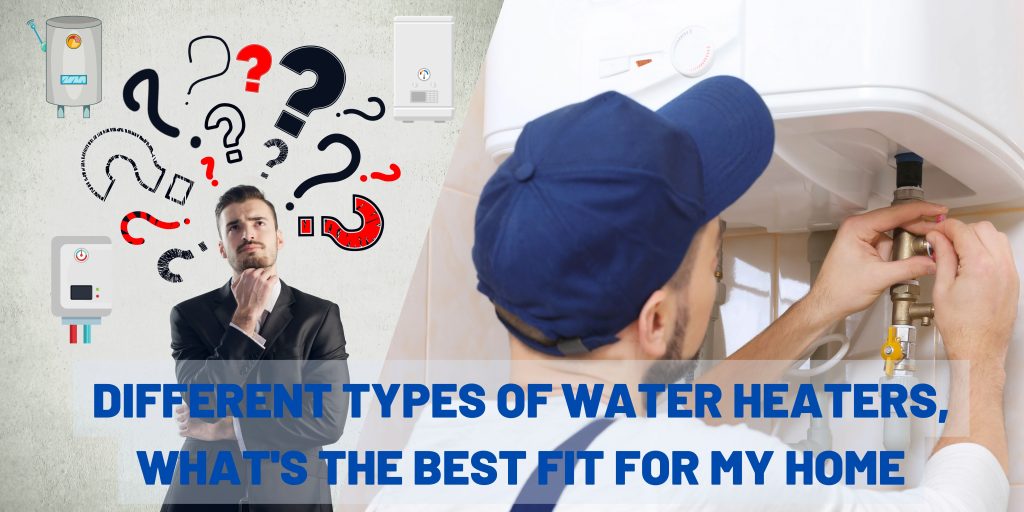- Serving Our NJ Neighbors 24/7 (888) 333-2422
A Wide Range Of Water Heater To Select From For Your Home! How To Select The Right One

Not sure how to heat the water in your house? The good news is that there are several water heater alternatives available for you to have in your home. We are here to explain the various water heater models and what things you should take into account when choosing a new one.
DIFFERENT KINDS OF WATER HEATERS:
Water heaters come in five primary categories. Each system has its own advantages and possible disadvantages, but they all work to heat the water that enters your home’s pipes and faucets. Let’s examine your choices in more detail:
WATER HEATER FOR CONVENTIONAL STORAGE TANKS
Consider a storage-tank water heater if you feel most comfortable with the traditional. The tank provides a ready-to-use hot water reservoir and frequently has a capacity between 30 and 120 gallons. The amount of water that can be heated and stored at once depends on the size of the tank.
For instance, if your tank is the most popular 40-gallon size, your device will only be able to heat and distribute 40 gallons of hot water total until it runs out. The tank may take some time to fill up and reheat more water whenever you run out of hot water.
This style of water heater often costs the least and is the simplest to install. Before committing to a tank, you should assess the space and water use of your house.
TANK-LESS WATER HEATER:
Are you sick of having hot water run out so quickly? To ensure a constant supply of hot water throughout your house, think about investing in a tankless (on-demand) water heater.
This kind of water heater does not have a tank, as the name suggests. It fills and heats water as you direct using extremely hot coils. Since the water is heated when needed rather than being kept in a tank all day, even when it’s not being used, this approach uses less energy.
THERMAL SYSTEM:
Instead of producing heat directly, heat pump water heaters utilize and move heat from the air and ground to warm your water, which saves power. Since the pump normally rests on top, this system, which comprises of a tank, could take up more room than other devices. It frequently requires an air gap surrounding the heater of at least 1,000 cubic feet.
Avoid installing this system in chilly areas like a basement or in regions with extended cold weather because it depends on heat from the air and earth. Installation of heat pump water heaters is necessary in areas with year-round temperatures between 40° and 90°F.
Compared to a typical storage water heater, heat pump water heaters often cost more up front. Their higher original cost is mitigated by their reduced running costs.
WATER HEATER OPERATED BY SOLAR
If you love vitamin D, so does your water heater! The most energy-efficient system is one that uses solar energy to heat water. They use heat-conductive materials to transport solar energy through roof-mounted solar panels, which heat your water.
If you reside in a warm, sunny area, this method can help you save a lot of energy and money. When overcast weather takes over, though, you might need natural gas or electricity to keep your water heater running.
CONDENSED WATER HEATER:
The greatest option for your house may be a condensing water heater if it operates on natural gas. This kind of water heater, which consists of a tank, passes the leftover gas fumes from your home through a coil that is situated at the bottom of the tank.
Incoming cold water circulates around the coil and absorbs the majority of the heat as you use hot water during the course of the day. Compared to a normal water heater, which wastes energy by venting hot exhaust fumes outside the flue, this tank is more energy-efficient.
For this type to be energy-efficient and provide your family access to adequate hot water throughout the day, a bigger tank is usually necessary—probably one that holds more than 55 gallons.
WHAT KIND OF WATER HEATER TO BUY?
Now that you are aware of the many kinds of water heaters, let’s explore the elements that might influence which system is the most suitable for your New Jersey home:
Energy Source: The most widely used energy sources are electricity, geothermal energy, natural gas, oil, and propane. You should pick the most affordable and accessible option based on your residence and region.
Size and Capacity: Your water heater must be the right size to operate as efficiently as possible. If a tank water heater is what you’re considering, choose a model with a gallon capacity that corresponds to the size of your family. For size advice, see the Energy Guide published by the federal government.
Space: Your choice will be influenced by where your water heater will be placed. Consider a large-capacity water heater if your basement has lots of room. If you reside in a smaller condo or apartment, a tankless water heater that is portable is probably your best choice.
Budget: It costs money to use hot water. Your budget for the water heater system you choose will be influenced by the elements mentioned above as well. Even though you’ll want to get a system that is reasonably priced, be sure it is effective for your house and will last you for a long time.
WHAT IS THE LIFESPAN OF WATER HEATERS?
Water heaters may last a very long time with the right keep and care. Though some systems are more durable than others, a tankless water heater may last up to 20 years, whereas a traditional storage-tank water heater normally lasts 8 to 12 years on average.
You should keep an eye out for any ageing indicators when your water heater enters the second half of its lifespan. Rusty hot water may indicate a tank issue. Cold water instead of normal hot water may indicates a pipe issue. A water heater replacement is frequently necessary when there is loud pounding, rumbling, or knocking noise coming out.





